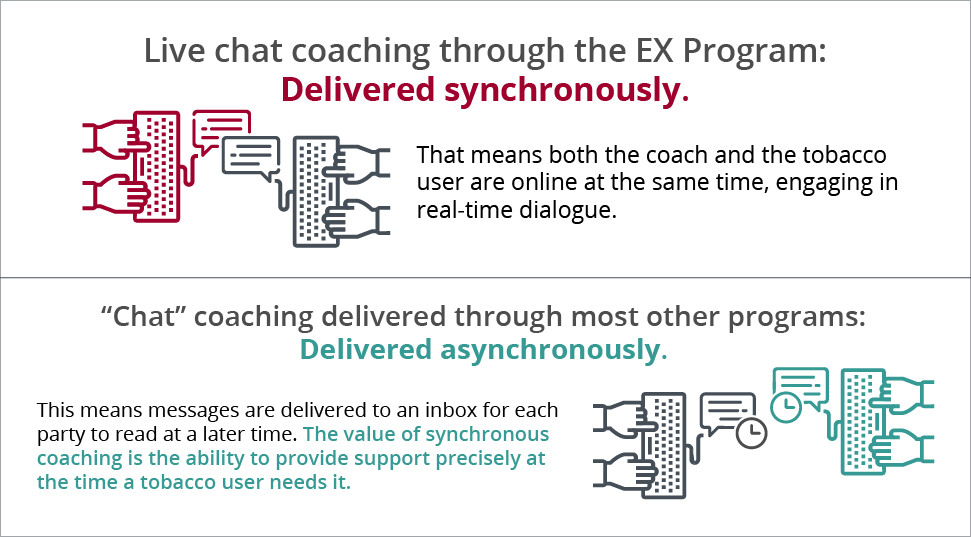When it comes to quitting tobacco, a one-size-fits-all approach can miss the mark. The needs and experiences of people who smoke are different than those who vape. Those with mental health conditions need different support than those without such challenges. People quitting for the first time have different expectations than those who have tried many times.
This is why having more than 1 quit smoking method is crucial. But it’s not simply enough to offer different strategies. They need to be engaging, and they need to work.
Research is in our DNA
At Truth Initiative, we don’t just build programs around existing evidence. We conduct rigorous research to advance the science around what makes tobacco cessation treatments appealing and effective.
Our funding track record is testimony to the rigor and innovativeness of our work. Our research has been consistently funded over the past 12 years by the National Institutes of Health (NIH). We’ve led and collaborated on numerous large-scale randomized clinical trials and been awarded some of the most competitive research grants.
Studying Live Chat Coaching for Tobacco Cessation
We recently completed a study on digital live chat coaching as an innovative tobacco cessation treatment modality. Coaching delivered face-to-face or via telephonic interactions has long been known to be effective in helping people stop smoking.
However, tobacco users are less and less likely to use these channels with each passing year. The time and costs of traveling to an in-person appointment can make face-to-face coaching a logistical challenge. And for some people, it can be challenging to talk with a coach by telephone about the struggles of quitting.
Live chat digital coaching connects tobacco users with a quitting expert for real-time, personalized support for wherever they are in their quitting journey. It can be done on an ad hoc or scheduled basis, entirely at the user’s convenience. And it can be done privately and discreetly.
But can you really deliver a meaningful coaching experience through the Internet?
Our Research Methodology for This Quit Smoking Method
To answer this question, we randomly selected 100 chats from the EX Program and examined the transcripts.
Our focus was on whether coaches created a supportive, understanding relationship and delivered evidence-based cessation strategies – 2 key domains of evidence-based counseling. We specifically looked at the presence of motivational interviewing (MI) skills and behavior change techniques (BCT).
MI is a set of specific observable communications that are proven to build a strong relationship through compassion, acceptance, and collaboration. BCTs are essentially the “active ingredients” of a tobacco cessation intervention – for example, strategies to reduce negative emotions when quitting or to understand the antecedents that trigger smoking.
We developed a structured coding guide that defined 3 key MI skills and 61 BCTs drawn from the literature. All chats were coded by two researchers.
We found that BCTs were observed in 100% of chats and MI skills were observed in 86% of chats. Especially common were BCTs providing social support and social reward, educational information about health consequences of smoking, and pharmacological support – the core components of tobacco dependence treatment.
The most common MI skill (seen in 76% of chats) was the use of open-ended questions, designed to evoke language supporting change. Affirmations are statements that recognize the user’s strengths, reinforce progress, and offer an optimistic perspective in the face of difficulties. These were observed in nearly half of all chats (47%). Reflective listening statements express understanding or compassion and were observed in 38% of all chats.
It’s important to note that coaching through the EX Program is delivered synchronously. That means both the coach and the tobacco user are online at the same time, engaging in real time dialogue.
Most programs that use the term “chat” or even “live chat” refer to coaching that is delivered asynchronously – messages delivered to an inbox for each party to read later. The value of synchronous coaching is the ability to provide support precisely at the time a tobacco user needs it.
When cravings hit, when stress peaks, when uncertainty begins to take hold, it’s critical to provide real-time support. The ability for our members to get this support discreetly and immediately is unparalleled.
What this study shows is that live chat coaching can deliver empathic real-time, personalized support and evidence-based interventions, which have previously only been available in person or by phone. It brings together the spontaneity and support that can be provided by an expert coach with the reach and convenience of a digital interface.
Data-driven Enhancements to Quit-smoking Method for the EX Program
Our science doesn’t just inform the field – it results in key program optimizations informed by the wealth of data we examine.
For example, we found that one of the BCTs we examined called “Credible Source” was infrequently observed in the chats we coded. This particular technique refers to persuasive communication from a credible source (e.g., health professionals, celebrities, a leader in the field) in favor of or against the target behavior.
This finding made us realize that we could be doing a much better job showcasing our partnership with Mayo Clinic and their role on our coaching team. This is now a standard part of our initial greeting to participants when they chat with us.
This study is just one example of our commitment to advancing the science of digital interventions. We continue to evaluate recently published papers in the field and pursue our own rigorous research to ensure our EX Program coaches are delivering the best possible service to our members.
To learn more about our live chat program, please visit our program page or contact us to see a demo. To see our portfolio of research, please visit our research section.





